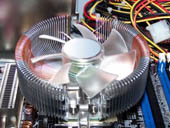
Purpose
To determine whether extreme temperatures (both hot and cold) affect how well a computer performs given tasks.
Additional information
Extreme heat and cold affects smaller electronics, such as compact disc players, cell phones and radios. Will extreme temperatures affect how well a computer works too?
Sponsored Links
Required materials
- A laptop computer
- Access to a refrigerated environment, such as a walk-in freezer or refrigerator
- Access to extreme heat, such as in the car during the summer
- Access to an area that is normal room temperature, such as your living room
- Thermometer with the ability to measure ambient temperature
- Journal or logbook
Estimated Experiment Time
This project will take no longer than a day to perform; however, you will most likely want to conduct this particular experiment in the summer – otherwise, it may be difficult to find an area in which extreme heat is present.
Step-By-Step Procedure
- 1. Boot up the laptop computer in your living room. While the computer is loading, measure the temperature of the air with the thermometer and record in your logbook. This part of the experiment will be your control.
- 2. Perform several functions on the computer, such as word processing and accessing the Internet (if available). You can also use the calculator function of the computer and play a game of Solitaire. You may also consider loading a game that is both memory and processor intensive since they really push the system limits. Record how easily each function on the computer is performed.
- 3. Repeat steps 1 and 2 in both the extremely cold environment and the extremely hot environment. Let the computer sit in the area for at least ten minutes to assume the surrounding temperature before you conduct the experiment. Remember to record the temperatures and how well the same computer functions that you performed at home now perform in the different temperatures.
Note
N/A
Observation
How well does the computer function in a hot environment? How well does it function in a cold environment? Do you think a computer is affected by extreme hot or cold temperatures? Do the different temperatures affect the computer in the same way or in different ways? Does the computer run slower or faster? How can this information be applied to every day life for school and work?
Result
It is likely that one or both of the extreme hot and cold temperatures will affect how well the computer functions. Compare the results to how well the computer works in normal room temperature.
Sponsored Links
Take a moment to visit our table of Periodic Elements page where you can get an in-depth view of all the elements,
complete with the industry first side-by-side element comparisons!